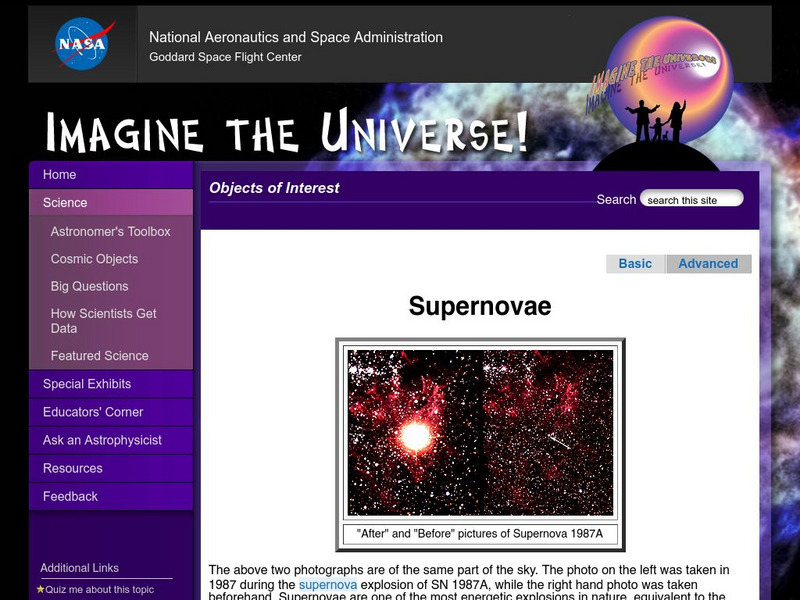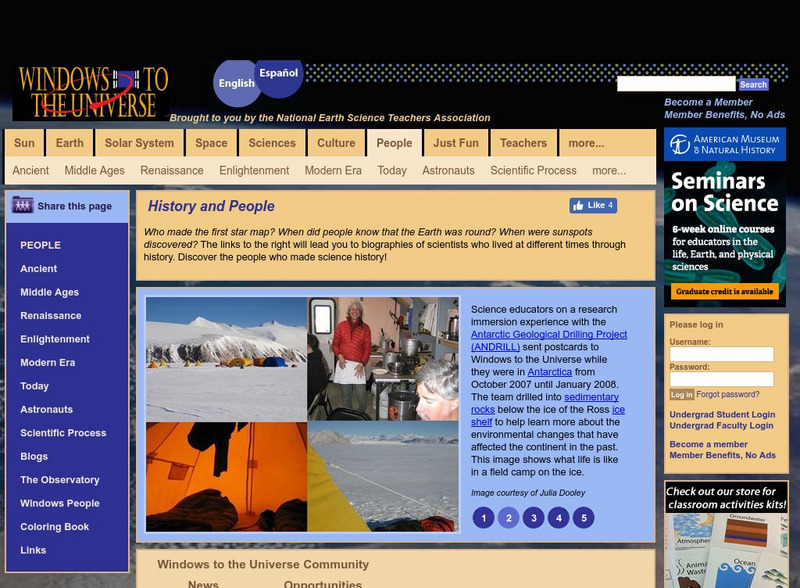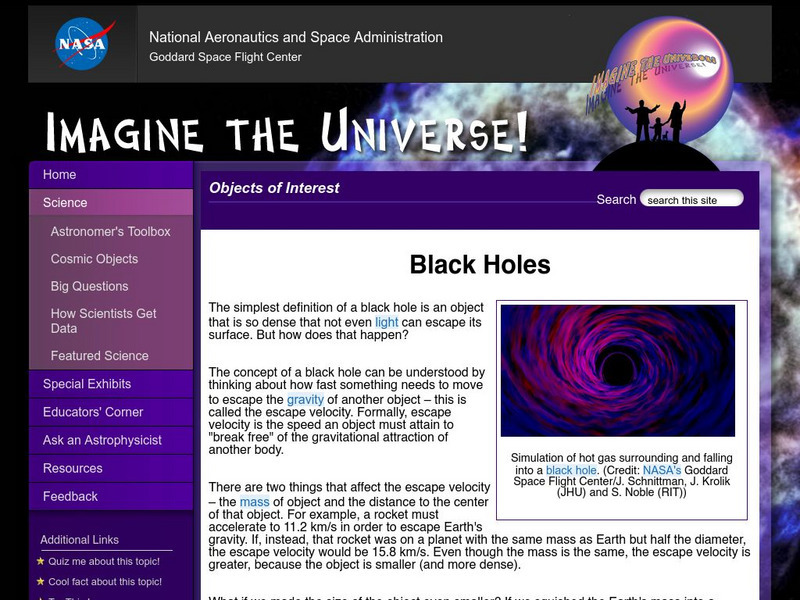Hi, what do you want to do?
NASA
Nasa: Imagine the Universe: Supernovae (Advanced)
Supernovae are divided into two basic physical types, including a description of supernova types and how they are classified based on the existence of hydrogen spectral lines. Definitions of key terms are provided.
Polk Brothers Foundation Center for Urban Education at DePaul University
De Paul University: Center for Urban Education: Learning About the Solar System [Pdf]
"Learning about the Solar System" is a one page, nonfiction, reading passage about scientists and learning about our solar system and how it works. It is followed by constructed-response questions which require students to provide...
NASA
Nasa: Image Science Center: Ask the Space Scientist
A NASA scientist, Dr. Sten Odenwald, answers many students' questions. Topics include planets, galaxies, black holes, the origin of the universe, and common misconceptions about space.
Khan Academy
Khan Academy: Activity: Scale of the Universe on a String
This activity will help your students comprehend the huge scales of time and space by using familiar objects. You can explore the massive distances of our Solar System using scale models made out of string. Included is a scale model of...
Scholastic
Scholastic: Study Jams! Science: Our Solar System: The Universe
A video and a short multiple-choice quiz on the Universe and what it is made up of.
TED Talks
Ted: Ted Ed: Is There a Center of the Universe?
It's been a long road to the discovery that Earth is not the center of the Solar System, the Milky Way, or the universe; great thinkers from Aristotle to Bruno have grappled with it for millennia. But if we aren't at the center of the...
Natural History Museum
Natural History Museum: Our Place in the Universe
Part of a larger online exhibit on the moon and space, this site deals with one's place in the universe. The topics covered include the sun and solar system, the galaxy, and the universe.
Other
University of Leicester: Sun
Provides a brief overview of the Sun, including a focus on solar eclipses, solar wind, and solar sailing.
Harvard University
Harvard University: The Solar System
These hands-on activities are a great way for students to gain perspective on the relative sizes and distances of each planet, the relationship between the sun and Earth, and much more.
National Earth Science Teachers Association
Windows to the Universe: History & People
Biographies of people throughout history who looked at the sky and wondered what was there. Links to a detailed description of the planets and interactive activities.
National Earth Science Teachers Association
Windows to the Universe: Our Solar System
Our solar system is filled with a wide assortment of celestial bodies - the Sun itself, our eight planets, dwarf planets, and asteroids - and on Earth, life itself! The inner solar system is occasionally visited by comets that loop in...
University of Texas at Austin
The University of Texas Mc Donald Observatory: Solar System Science
Each student becomes the "ambassador" for a planet and prepares by researching their planet, then meets with other ambassadors to form new mini-solar systems.
Polk Brothers Foundation Center for Urban Education at DePaul University
De Paul University: Center for Urban Education: Learning About the Solar System [Pdf]
"Learning about the Solar System" is a one page, nonfiction, reading passage about the Milky Way gallaxy and how scientists learn about it over time. It is followed by questions which require students to provide evidence from the story;...
Utah State Office of Education
Utah State Office of Education: How Did the Universe and Solar System Develop?
Explore this unit to learn how the universe began. Through illustrations, videos, and classroom activities, gain an understanding of how stars help with the formation of elements.
Polk Brothers Foundation Center for Urban Education at DePaul University
De Paul University: Center for Urban Education: Learning About the Solar System [Pdf]
"Learning about the Solar System" is a one page, nonfiction, reading passage about the Milky Way gallaxy and what it takes to be a scientist. It is followed by constructed-response questions which require students to provide evidence...
Alabama Learning Exchange
Alex: Scaling Down the Solar System
In this lesson students will work collaboratively to gain a better understanding of the vastness of space by scaling down the solar system. This lesson plan was created as a result of the Girls Engaged in Math and Science University,...
University of Texas at Austin
The University of Texas Mc Donald Observatory: Jupiter
Discover interesting facts about Jupiter, the largest planet in the solar system.
NASA
Nasa: Imagine the Universe: Black Holes
Learn what black holes are and the myths that surround them.
University of Texas at Austin
The University of Texas Mc Donald Observatory: Venus
Discover interesting facts about Venus, the hottest planet and the second planet from the Sun.
Sophia Learning
Sophia: Space Sciences: Introduction to the Mars Science Laboratory
Created to teach students of the 21st century, SOPHIA is bringing Mars straight to your fingertips. Discover what scientific discoveries are occurring in the rest of the universe with this interactive tutorial.
CK-12 Foundation
Ck 12: Plix: Gravity in the Solar System
[Free Registration/Login Required] Test your knowledge of Newton's Law of Universal Gravitation with an animation and a short quiz.
A&E Television
History.com: The Space Race: Interactive Universe
A virtual journey through space offers photos and facts about Earth and its neighboring planets, comets, other celestial bodies of the Solar System, and the Milky Way and Andromeda galaxies.
Harvard University
Harvard University: Eye on the Sky, Feet on the Ground
An ebook filled with information and classroom activities covering several astrological topics such as the Earth's rotation and the solar system. Many tips and teaching tools are available to aid in discovering what the sky has to offer.
University of Texas at Austin
The University of Texas Mc Donald Observatory: Uranus
Learn interesting facts about the planet Uranus and its unique history.






![De Paul University: Center for Urban Education: Learning About the Solar System [Pdf] Unit Plan De Paul University: Center for Urban Education: Learning About the Solar System [Pdf] Unit Plan](https://static.lp.lexp.cloud/images/attachment_defaults/resource/large/FPO-knovation.png)














